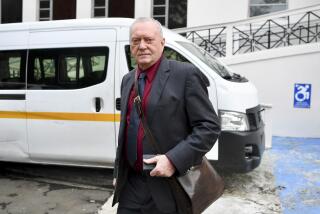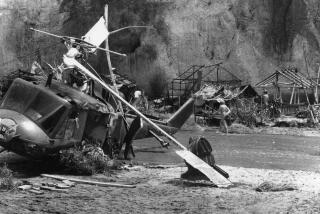Winners and Losers in Keating Case
- Share via
WINNERS
American Continental bondholders:
Thousands of small investors got their cathartic pound of flesh with Keating’s conviction. But they had nothing else to gain from it. Their case to recover their funds is in a federal court in Arizona, where they hope to recoup as much as possible of more than $250 million they lost when Keating’s empire collapsed.
Ira Reiner, Los Angeles County district attorney:
In the eyes of bondholders-- make that voters--he will always be a winner because he moved quickly to become the first to indict Keating and win a conviction. But the grand jury indictment was flawed: The trial judge threw out more than half of the charges.
William Hodgman, deputy district attorney:
The prosecution’s lead trial lawyer, brought in after the grand jury investigation, did an admirable job in trying a difficult case that he had not fashioned. He also had to cover for Reiner’s early flip-flops on Keating’s bail, which ranged from a recommendation of no bail to concurring in the $5-million bail set by Judge Gary Klausner.
Michael Patriarca, regional director, Office of Thrift Supervision:
His testimony was among the more damaging of regulators called to the stand. His star rose quickly in the agency when he and William K. Black decided to take on their bosses in congressional hearings two years ago. Keating’s conviction increases Patriarca’s stature as one of the most powerful federal thrift regulators, perhaps more powerful than any, including his boss in Washington.
William K. Black, regional counsel, Office of Thrift Supervision:
His dislike for Keating came through in his testimony as he mentioned several topics the court had ordered him not to disclose. Black may have good reason, at least personally, for his dislike: Keating once tried to get him fired. Black’s stature, boosted by his colorful congressional testimony in 1989, rises another notch with Keating’s conviction.
LOSERS
Charles H. Keating Jr., defendant:
Though an eternal optimist, at least outwardly, he still had to expect a conviction and hope for the best before an appellate court. He still faces a likely federal indictment and a civil trial in Arizona on several dozen civil lawsuits, including a $2.7-billion government action accusing him of racketeering and fraud.
Stephen C. Neal, defense attorney:
The experienced trial lawyer used his background in complex business litigation to try to persuade the jury that his client didn’t defraud anyone and, instead, used top-notch lawyers and accountants to structure and monitor the bond sales program. He kept his trial objections to a minimum, letting small matters slide and letting the prosecution hang itself at times. Conviction of such an unpopular defendant doesn’t tarnish his reputation because he raised a plausible defense.
ON THE SPOT
Lance A. Ito, Superior Court judge:
He was well prepared and, with patience, wit and control of the courtroom, kept the trial focused on the main issues. He displayed the intellectual acumen to deal with the complex issues raised by the unique prosecution and a monstrously long grand jury record. And, as an elected judge, he had the courage to dismiss counts three times during pretrial hearings, engendering the wrath of bondholders in the highly publicized case.
More to Read
Inside the business of entertainment
The Wide Shot brings you news, analysis and insights on everything from streaming wars to production — and what it all means for the future.
You may occasionally receive promotional content from the Los Angeles Times.










